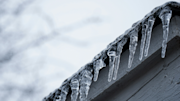Ideas to help tackle condensation in your home
Get ready for winter
The ultimate guide for your home

Winter is on the way and with it comes a higher likelihood of making a claim on your home insurance due to bad weather. However, it’s important to know the difference between damage caused by wear and tear and damage caused by an unexpected event such as a storm.
This is because home insurance is there to put things right when an insured event happens. However, if the damage is caused because your property needs maintenance, your claim may not be paid. It’s the difference between a well maintained chimney blowing down in a storm versus crumbling from disrepair. But it’s not all doom and gloom.
With the help of experts from our Home Insurance claims team, we've put together a winterproofing video as well as some top tips on common areas of wear and tear.
Outside
Ready your roof
Your roof is the first line of defence against the weather, so it’s important to keep an eye on it. All types of roofs can be damaged by wear and tear, so arranging a roof inspection to check for problems such as missing, slipped or loose tiles is a good place to start. In other types of roofs, lead flashing may need replacing and flat felt roofs may show visible signs of wear.
Another good idea is to have your chimney checked for loose or missing mortar, as this would require maintenance work to get it back to top condition.
If you find any issues on your roof, it’s important to fix them as soon as possible to keep your home watertight. Leaving the problem to get worse could not only cause bigger problems in your home, but also be more expensive to put right.
Gear up your gutters
While you’re dealing with the outside of your home, don’t forget to give your gutters some love. Clearing gutters of leaves and debris will help them do their job properly and help you see if there are any cracks that need fixing. Overflowing or leaking gutters and downpipes can allow water to enter your home or lead to damp problems, so getting them sorted quickly is worthwhile.
Guard your garden
Investing some time in getting your garden ready for the cold weather can also pay off. Clearing away fallen leaves can stop them blocking drainage points and gutters, while cutting back overgrown or hanging branches could avoid damage to property if they break during windy conditions.
If you are planning not to use your outside tap over the winter months, use the shut off valve (if you have one) and add insulation to protect the tap. Finally, make sure your fences and gates are secure, as many insurers do not cover storm damage to fences, hedges and gates.
Inside
Protect your pipes
A burst water pipe or storage tank can be a disaster for your home. The best way to protect them during the colder months is shield them with a foam layer (lagging), which will prevent them from freezing and bursting. This is especially important for any part of your water system that is in the loft or garage.
Heating help
Heating costs are rising, but there are ways to make the most of the heat you use. Covering windows with lined curtains or adding draught excluders to your doors will help keep that essential warmth from escaping. Try and maintain a steady temperature, rather than using a high temperature in short bursts.
To avoid pipes freezing, it’s recommended to leave the heating on at a minimum temperature of 13°C. It is also worth comparing energy providers to make sure you are on the best tariff, as switching could save you money.
Incredible insulation
It is important to make sure your home is well insulated, especially in the winter months. Getting your loft area well insulated not only keeps essential heat in your home but can help keep your energy bills down too.
Avoid boiler bother
One way to make sure you’re not caught out by a boiler on the brink during the winter is to have it serviced regularly by a qualified engineer. This ensures your boiler is working safely and efficiently. It can also help flag issues before they become critical.
If you have a condensing boiler in your home, insulating the condensate pipe helps limit the risk of it freezing. Any pipes external to your home should be angled in the best way to avoid freezing. The slope/pitch of a pipe is called the fall and a qualified plumber will be able to help you check this if you’re concerned.
Where’s your water supply?
Make sure you know where your stopcock is located. If you need to turn off the water supply, you’ll be glad you checked ahead of time.
Defend from damp
It may be cold outside, but keeping your home ventilated is still important. Opening your windows to air out your home every so often can help stop the build up of damp.
Home alone
If you’re going away and leaving your home unoccupied, turn off the water supply at the main stopcock. This will still leave water in the heating system, so if your home is unoccupied for an extended period, think about draining the system in full and turning off the water supply. Use a qualified plumber for such works.
The importance of insurance
Making sure your home is covered for any unexpected damage is crucial, especially during the winter months. Check your insurance is up to date with the correct information about you and your home. You should also keep your policy number and the claims line phone number somewhere safe and easy to find just in case.
If you have Co-op Home Insurance and need to make a claim, we're here to help.
Exclusive offers for Co-op Members

Home insurance
Exclusive member price on home insurance.
Your discount is not available on add ons and is applied if your details match those on our membership database.

Renters insurance
Co-op Members who take out renters insurance will get a 5% discount.
Member discount applied if matched during quote process.





